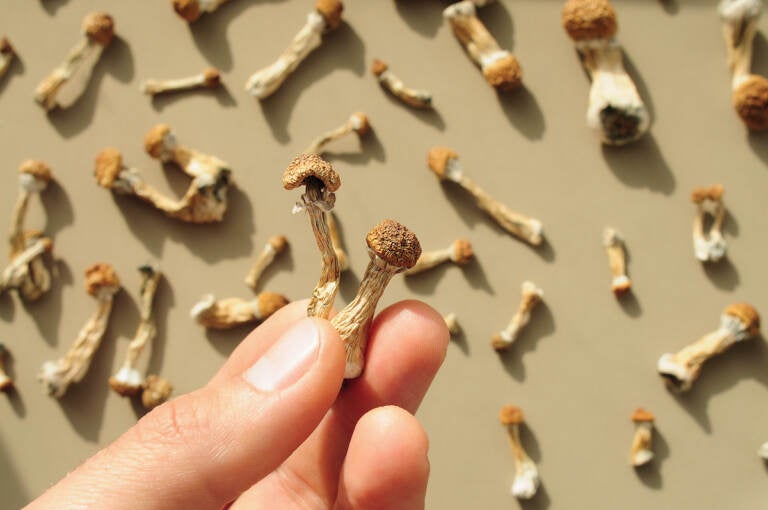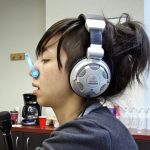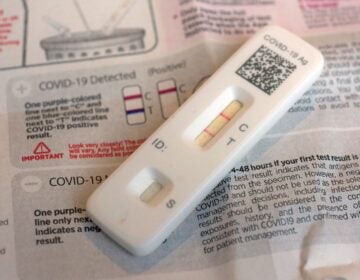Could magic mushrooms cure COVID-related smell loss?
Users report that psilocybin restored their sense of smell. We ask scientists what could explain this seemingly healing effect.
Listen 15:37
(Pixelvario/BigStock)
This story is from The Pulse, a weekly health and science podcast.
Find it on Apple Podcasts, Spotify, or wherever you get your podcasts.
The experiment
Dustin was ready. He took the magic mushrooms — procured with the help of a tattoo artist friend — ground them up, and mixed them with lemon juice, before throwing it all back in a single gulp.
Then he put on some sunglasses, strapped on his headphones, and hit play on one of his favorite albums: Natalia Lafourcade’s “Hasta la Raiz.” He was ready for his trip to begin.
This was Dustin’s first time taking shrooms in 17 years — a last-ditch effort to try to regain his sense of smell, which he’d lost after a bout with COVID-19.
“You start realizing that you can’t smell things that you normally would,” said Dustin, who asked that his last name be withheld for privacy reasons.
He tried to remind himself that losing his sense of smell wasn’t the worst possible outcome.
“You could be in the hospital, you know. You could have died from this,” he said.
But it was hard. He missed smelling things, like the coffee his wife made in the mornings. Or tasting the meals they’d spent hours cooking — one of Dustin’s mental health outlets during the pandemic. Even home didn’t smell like home anymore.
Dustin wasn’t sure what to do. His loss of smell, or anosmia, was just one of a myriad of lingering symptoms resulting from COVID-19. His doctors didn’t seem to have many answers.
He’d heard about smell training — a kind of physical therapy for the nose that involves sniffing pungent scents several times a day — but sporadic efforts hadn’t yielded any results. And Dustin was getting desperate.
So he started looking for help online. That’s where Dustin came across the idea that magic mushrooms could help treat anosmia.
“I had read somewhere that they change your brain activity, but then they also have an impact on your olfactory system,” he said. “I guess that I probably should have done more research about it and got my ducks in a row, but I was at a point of desperation where I was just like, ‘I just want to try this because if it gives me any sense of relief, whether it’s the sense of smell or mental wellbeing, I’m willing to roll the dice and try it.’”
The sense of smell returns
A half hour into his trip, Dustin “started to feel the fuzzies,” he said.
An hour in, he was starting to see patterns and tracers of light.
By two hours in, he was fully into it. That’s when it happened.
“It hit me in the face,” Dustin said.
Namely: his own body odor.
“And I was like, ‘What the hell is going on? Like, I smell awful.’ And then I was like, ‘Oh my god, I can smell!’”
Even in the middle of a psychedelic trip, Dustin knew how big this was. He says the depth of smell was incredible. If smells were represented by colors, he could see the whole rainbow and then some.
Dustin was ecstatic. He started running around the apartment smelling things. His wife threw him an orange.
“And I peeled it into and I was like, ‘Oh my gosh, like, I can taste it. Like, really taste it!’”
Later that night, he reveled in the enchiladas they had for dinner.
“I could taste the individual ingredients,” he said. “I mean, it’s not anything I’d wish on anybody to lose their sense of smell, but to lose it and have it come back that abruptly was really — it was a special experience.”
Dustin ended up posting about his experience on Reddit. And he says the biggest question he got from other people was, “Ok, it worked — but did it last?”
For the most part, Dustin says, the answer is yes. That first day, his sense of smell was fully back — he estimates 95 to 100%. Since then, it’s varied from day to day, though he says it hasn’t dipped lower than 90%.
Could science explain what happened here?
Stories like Dustin’s have garnered their own little cult followings online — where thousands of people, if not many, many more — are looking for answers, desperate to regain their sense of smell.
Other first-person accounts with magic mushrooms run the gamut — from instant success, like Dustin’s, to people whose sense of smell returned over several sessions with magic mushrooms, to those who experienced no effect at all.
But there were enough success stories to get us wondering: Could magic mushrooms really be able to treat — or even cure — COVID-related anosmia? We checked in with several scientists to hear what they thought.
Hypothesis #1: Psilocybin rebuilds lost neurons
This was the most popular hypothesis floating around on Reddit posts like Dustin’s.
A while back, some research came out suggesting that psilocybin — the active ingredient in magic mushrooms — can cause neurons to regenerate, a process called neurogenesis.
Neurons are the workhorses of our olfactory systems. They live in our nasal cavities, and their job is to grab onto odor molecules, and send info about them to the brain.
So the idea with this theory is that COVID-19 is attacking olfactory neurons — and the shrooms are helping them grow back.
This isn’t a brand new idea. Even before COVID-19, there were researchers focused on neurogenesis as a potential fix for anosmia. One of them is Brad Goldstein, an otolaryngologist (or ears, nose, and throat doc) and researcher at Duke University who’s been studying post-COVID anosmia, and is also an expert on neurogenesis.
So does he think neurogenesis could be putting the magic in magic mushrooms?
Probably not.
For one thing, it turns out the evidence that psilocybin causes neurogenesis in humans is pretty thin.
“The evidence from mice is minimal, and [they] was looking at neurogenic areas of the brain, not the olfactory epithelium,” Brad said.
He also pointed out that it would take weeks of neurogenesis to reverse anosmia — not an afternoon of tripping.
But he suggested another possibility.
Subscribe to The Pulse
Hypothesis # 2: It’s related to serotonin receptors
Though Brad had his doubts about whether shrooms could actually help improve anosmia, he said if they could, his guess would be that it comes down to psilocybin’s effects on the brain.
The way magic mushrooms create their wild psychedelic effects is by modulating certain serotonin receptors — turning them up or down, or changing how signals are sent from one cell to another.
And serotonin may be involved in some of the regions that process smells.
“Theoretically, if you were turning up serotonin signals — and some of those circuits are using serotonin — somebody could have an olfactory perception change as a downstream effect of that,” he said.
This idea resonated with Chris von Bartheld, a professor of physiology and cell biology at the University of Nevada School of Medicine, who, like Brad, has been studying COVID-related anosmia.
“Psilocybin is known to have changes in perception, and so I could imagine that — let’s say you have COVID, you lost your sense of smell,” he said. “So for weeks or even months, there has been no activity in your olfactory nerve. And so the parts of the brain that normally receive this information, they noticed that, well, there’s nothing coming in.”
As a result, Chris said, those parts of the brain may stop paying attention.
“So maybe what the psychedelic mushrooms do is to basically hit a reset button,” he said. “And so, whatever is coming in is now being perceived … then the cortical areas that normally receive olfactory information are kind of, ‘Oh, there is something,’ and then they pay more attention to it.”
In other words, maybe the psilocybin is waking up the part of the brain that processes smells.
Hypothesis #3: It’s neither of those!
Brad added that there’s a catch with his and Chris’ serotonin hypotheses: They’re both centered on the brain.
Early on, that’s exactly where many scientists speculated the problem was — damage to olfactory neurons and possibly the brain.
But what a growing number of studies (including this one that Brad worked on) have found, is that COVID-19 isn’t attacking olfactory neurons or the brain — but instead, is infecting cells that support olfactory neurons. And that is what’s causing people to lose their sense of smell.
“Damage is almost certainly in the nose, at the olfactory epithelium, not in the brain cortex,” Brad said. “So a drug that modulates cortical synapses, not involved in the damage, is not likely to be directly impacting repair or recovery.”
In other words, a solution that targets the brain is unlikely to fix a problem located in the nose.
Hypothesis #4: It’s all an illusion
Get ready for whiplash — because maybe the explanation has to do with the brain after all.
How, you ask? By doing what shrooms do best.
“I mean, it’s a hallucinogen,” Brad said. “And so I could see why eating a hallucinogen that stimulates serotonin could give you a perception that might include olfaction [smelling].”
He added that shrooms don’t necessarily have to be treating the actual problem in order to give people an olfactory perception.
“Whether that’s purely a hallucination or an augmentation of some signaling that’s happening, I don’t know,” he said.
Pam Dalton, an investigator at the Monell Chemical Senses Center, had a similar thought.
“The accounts I’ve read often report a gradual increase in smell over multiple sessions with psilocybin, which of course cannot be differentiated from either spontaneous recovery or increased awareness of one’s ability to smell,” she said. “I have also read accounts where an individual ‘knew’ they were smelling phantom odors following a shroom experience, but then started to recognize odors in different situations.”
It’s hard to draw any conclusions from these reports without the help of a randomized, placebo-controlled trial, she said, “However, there does appear to be a heightening of sensory experiences more generally from psilocybin and thus, there may be some amplification of even weak olfactory signals that folks are now able to perceive.”
This theory works better with people who are only able to smell things while taking mushrooms.
“They say it fades immediately after the shroom experience, which is consistent with a psychogenic origin for the ‘smell experience’,” Pam said.
Hypothesis #5: Shrooms quash inflammation
Neuroscientist Fred Barrett — the associate director of the Hopkins Center for Psychedelic and Consciousness Research — is an expert on psychedelics. And he has his own hunch about what could be going on.
“The idea that psychedelics could treat anosmia is frankly fascinating to me,” he said. “I think there’s a story — there’s a possible explanation for that.”
Namely, some recent research indicates that, in some circumstances, psychedelics can have anti-inflammatory properties.
“My understanding of anosmia in the case of coronavirus is [that it’s] due to an inflammation of the olfactory epithelium and the olfactory nerves that connect with the olfactory bulb and go back,” Fred said.
That inflammation could be part of what’s causing long-lasting anosmia in some people.
“If that’s the case. And if psychedelics have an anti-inflammatory effect, it stands to reason that adding an anti-inflammatory to your body would ameliorate the effects of an inflammation. And if people are recovering from anosmia through psychedelic use, that briefly would be my guess as to what might be happening.”
Hypothesis #6: It doesn’t work
Fred also said it could be something much less exciting than that — it could be that shrooms actually do nothing to help anosmia, and it’s all just a big coincidence.
“Over the hundreds of thousands and millions of people who have gotten COVID, and the subset of those folks who have had anosmia, and the subset of folks who are have anosmia that take psychedelics,” he said, “it may just be that a dozen people took a psychedelic right about the time they were going to recover from anosmia to begin with.”
‘Don’t try this at home’
All of the experts warned against trying to treat anosmia with shrooms or any other psychedelics.
Only more research will be able to show if any of these ideas hold up. Until then, ear, nose Brad Goldstein, ears, nose, and throat doc, said, anosmia sufferers should keep their ears to the ground about new treatments.
“I’m optimistic,” he said. “I think we may see some really new things come out before too long that hopefully will really be helpful.”
WHYY is your source for fact-based, in-depth journalism and information. As a nonprofit organization, we rely on financial support from readers like you. Please give today.







